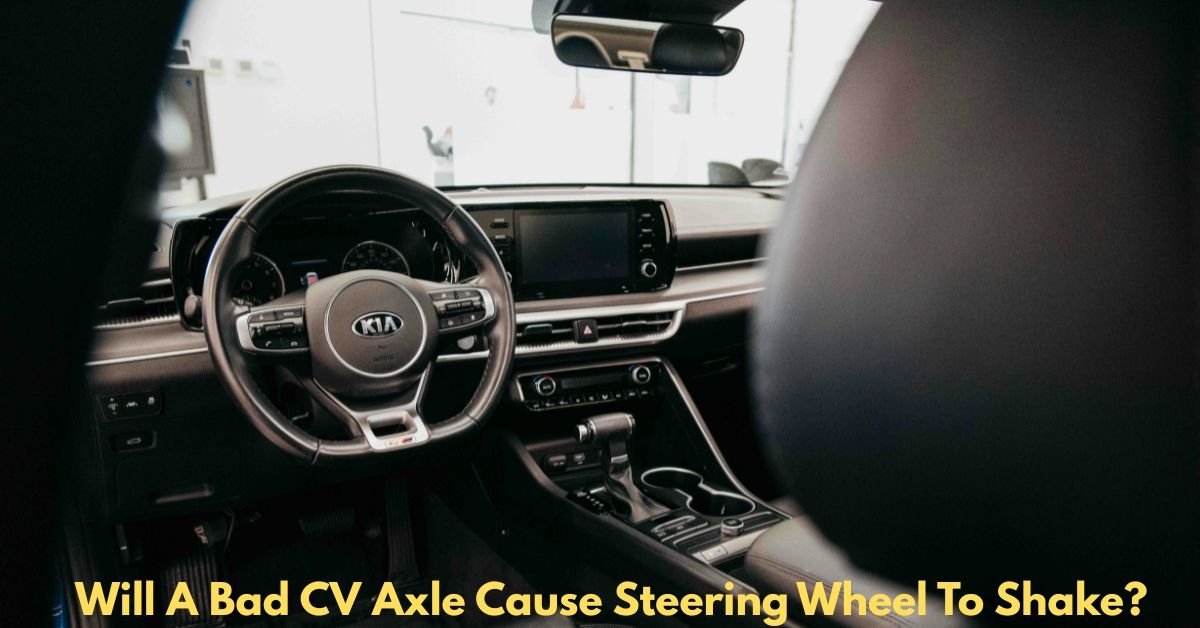Your vehicle’s performance is only as good as the health of its components. When something starts to go wrong under the hood—or under the chassis—your car will usually let you know. One such issue that drivers may encounter is a shaking steering wheel. But what’s the cause? Could a bad CV axle be responsible for this unsettling vibration? The answer is yes, a bad CV axle can cause your steering wheel to shake, but it’s not always the only culprit. Let’s explore how this happens, what signs to look for, and how to fix the problem.
Will a Bad CV Axle Cause Steering Wheel to Shake?
What Is a CV Axle?
First, it’s important to understand what a CV axle is. CV stands for constant velocity, and the axle itself is a crucial part of your car’s drivetrain. It facilitates power transfer by connecting the transmission to the wheels and enabling the suspension’s up-and-down action as well as the front wheels’ steering motion.
CV axles have CV joints at either end—inner and outer joints—which are protected by rubber boots filled with grease. These joints are essential for maintaining smooth, efficient motion, especially in front-wheel drive and all-wheel drive vehicles.
How a Bad CV Axle Causes Shaking
A bad CV axle—typically one with a worn or damaged CV joint—can absolutely cause your steering wheel to shake. Here’s how:
- Imbalanced Rotation: As the CV joint wears out or becomes damaged, it may no longer rotate smoothly. This causes an uneven rotation of the axle, leading to vibrations that travel up the steering column.
- Grease Leakage: Torn CV boots leak grease, which leaves the joint dry and exposed to debris. Once the joint begins to degrade, the resulting imbalance can produce noticeable shaking during driving—especially when accelerating or turning.
- Joint Play or Slack: A failing CV joint may develop “play” or looseness, which can also cause vibrations to be transmitted through the axle and felt in the steering wheel.
These symptoms are often more noticeable under specific conditions—typically during acceleration, deceleration, or turning. You may not notice the shaking while cruising at a steady speed on the highway, but it could become very apparent when you press the gas or turn the wheel.
Must Read: How To Remove Panel Under Steering Wheel?

Other Symptoms of a Bad CV Axle
In addition to a shaky steering wheel, a failing CV axle may produce:
- Clicking or popping noises, especially while turning
- Grease on the inside of your wheels or along the underside of the vehicle
- Knocking sounds during low-speed maneuvers
- Difficulty steering in extreme cases
If you’re experiencing multiple symptoms alongside a shaking steering wheel, there’s a good chance the CV axle is the root cause.
Could It Be Something Else?
While a bad CV axle can definitely cause a steering wheel to shake, it’s not the only possible reason. Other potential causes include:
- Unbalanced or misaligned tires
- Warped brake rotors
- Worn suspension components
- Bent wheels or damaged wheel bearings
Because so many different issues can cause a similar vibration, proper diagnosis is important. In addition to safety hazards, ignoring the problem or misdiagnosing it might result in future, more costly repairs.
What to Do If Your Steering Wheel Shakes
If you’re experiencing steering wheel vibration, especially while accelerating or turning, it’s time to inspect your CV axles. Here’s what you can do:
- Inspect the CV Boots: Look for tears, leaks, or missing grease.
- Listen for Noises: Clicking or popping when turning is a giveaway.
- Check for Vibration Patterns: Do the shakes happen at certain speeds or only during turns?
Having the car inspected by a trained mechanic is the best option. They can check the axles, suspension, tires, and brakes to determine the exact cause.
Final Thoughts
Yes, a bad CV axle can absolutely cause your steering wheel to shake. It’s one of several possible causes, but if you’re noticing the vibration during acceleration or turning—combined with noises or visible damage—it’s a strong indicator that the axle needs repair or replacement.
Don’t ignore a shaky steering wheel. What starts as a mild annoyance could end up being a serious hazard. Have your vehicle inspected promptly to ensure your safety and protect your car from further damage.
